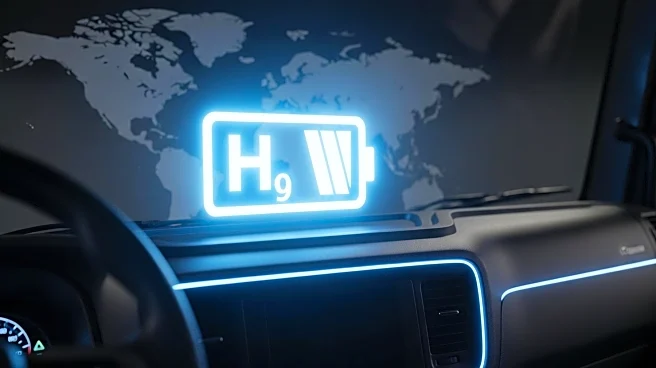What is the story about?
What's Happening?
The BloombergNEF 2025 Factbook on zero emission commercial vehicles indicates a significant shift in the global freight industry from hydrogen fuel cell trucks to battery-electric trucks. In the first half of 2025, nearly 90,000 zero emission trucks were sold globally, with 97% being battery-electric. This marks a substantial increase from 2024, while sales of hydrogen fuel cell trucks have halved compared to the previous year. The trend is particularly pronounced in China, where electric truck sales have doubled compared to 2023, driven by battery supply chains and cost-lowering incentives. In Europe, electric truck sales have grown by over 50% year-on-year, supported by infrastructure programs and urban zero emission zones. In contrast, the U.S. market has seen a decline in electric truck sales due to policy reversals and stalled mandates, with hydrogen trucks failing to fill the gap.
Why It's Important?
The shift from hydrogen to battery-electric trucks in the freight industry has significant implications for global decarbonization efforts. Battery-electric trucks offer higher efficiency, lower operating costs, and scalability tied to existing grid infrastructure, making them more competitive than hydrogen trucks. This transition impacts the economic viability of companies invested in hydrogen technology, with several firms facing bankruptcy or abandoning hydrogen projects. The trend also influences policy decisions, as regions like Europe invest heavily in charging infrastructure, further solidifying the dominance of battery-electric solutions. The U.S. market's lag in adopting electric trucks could affect its competitiveness in the global freight industry.
What's Next?
As battery-electric trucks continue to gain market share, further investments in charging infrastructure and technology advancements are expected. Companies may shift focus from hydrogen to battery-electric solutions to remain competitive. Policymakers might reconsider incentives and mandates to support the transition to electric freight. The U.S. may need to address policy barriers to catch up with global trends. The ongoing development of battery technology, such as improved range and efficiency, will likely drive further adoption of electric trucks.
Beyond the Headlines
The decline of hydrogen trucks raises questions about the sustainability and practicality of hydrogen as a fuel source in the freight industry. The environmental impact of battery production and disposal, as well as the ethical considerations of resource extraction, may become more prominent as battery-electric trucks dominate the market. The shift also highlights the importance of aligning industrial policies with technological advancements to achieve decarbonization goals.















